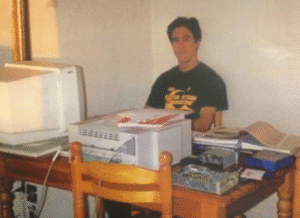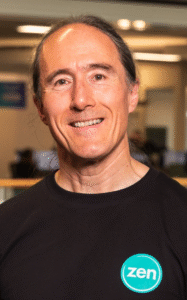….making it the longest standing independent ISP in the UK!
Zen internet, a B Corp certified business, has marked its 30th anniversary with a celebration at its Rochdale headquarters, honouring three decades of innovation, growth and doing business “the right way”.
The company officially opened its doors for business on 13 October 1995, following its incorporation by founders Richard Tang (CEO) and his brother Daniel on 13 September. It’s 30-year milestone makes it the UK’s longest-standing independent Internet Service Provider (ISP).
 Richard started Zen with just £5,000, a few Linux PCs, and six dial-up modems perched on an Ikea shelf. It’s grown from a two-person start-up into one of the UK’s leading independent ISPs, employing more than 650 people and serving businesses and consumers nationwide.
Richard started Zen with just £5,000, a few Linux PCs, and six dial-up modems perched on an Ikea shelf. It’s grown from a two-person start-up into one of the UK’s leading independent ISPs, employing more than 650 people and serving businesses and consumers nationwide.
“It’s testament to our longevity that we are the UK’s oldest ISP,” said Tang. “All our main competitors when we started have long since disappeared – yet we’re still here, stronger than ever, and still independent.”
From pub idea to pioneering ISP
Zen’s story began in the summer of 1995 when Tang, then a software engineer, first heard about the Internet. Over a pint in a local pub, he asked his brother, Dan, if he fancied setting up an Internet provider – and Zen was born.
By October that year, the pair had launched their first £10-a-month dial-up service, created from Richard Tang’s kitchen table, which could support six simultaneous users sharing just 64 kbps of bandwidth.
In 1998, Zen turned its first profit and by the early 2000s was riding the broadband wave, doubling turnover year-on-year and expanding rapidly across the UK.
Zen’s story is not just about technology, but also about the North West’s role in the UK’s digital economy. From its Rochdale base, the company has proved that innovation and resilience can thrive outside London and put Greater Manchester on the map as a hub for connectivity and digital services.
 Tang’s decision to base Zen in Rochdale, rather than London where most ISPs clustered, helped the fledgling company stand out. “It gave us space to grow,” Tang said. “We wanted to do things differently, and being outside the London bubble was part of that.”
Tang’s decision to base Zen in Rochdale, rather than London where most ISPs clustered, helped the fledgling company stand out. “It gave us space to grow,” Tang said. “We wanted to do things differently, and being outside the London bubble was part of that.”
Over the last 30 years, Zen has evolved alongside constant technological change and the internet itself – transitioning from dial-up to broadband and fibre services – while staying true to its independent roots.
Reflecting on the company’s journey, and looking ahead, Tang said: “When I started Zen, I could never have imagined how transformational the Internet would become. The fact that we’re still here 30 years later – thriving, independent and making a positive impact – is beyond my wildest dreams.”
“Zen remains proudly independent. I’ve seen so many of my peers sell up, but that’s never been my goal,” he said. “Zen exists to do right by people and the planet. Money is just the fuel to make that happen.”
That ethos underpins Zen’s B Corp certification, achieved in 2020, which recognises its social and environmental responsibility. From carbon reduction initiatives to employee empowerment, Zen continues to lead by example in how a tech company can balance profit with purpose.
Brits get nostalgic as Zen charts 30 years of going online
To mark its 30th anniversary, Zen commissioned new research exploring how Britain’s relationship with the internet has evolved — from floppy disks and dial-up tones to TikTok and AI.
The “Boomers vs Zoomers” study revealed that 31% of Brits remember floppy disks as their first way to access the internet, while a third of 18-year-olds have no idea what a floppy disk even is. Four in ten say YouTube or Facebook were their first online obsessions, while almost a quarter recall buying clothes as their first online purchase.
When asked what they miss most about the early days, Brits cited “simplicity” — a contrast to today’s always-on, endlessly scrolling digital world. Yet, despite changing habits, the internet’s role in modern life has never been more vital: a third of people said they couldn’t live without it, with top reasons including entertainment (60%), reconnecting with friends (54%) and learning or upskilling (35%).
“We’ve been there since the very beginning of the UK internet, which has come from nowhere to become a critical part of our lives,” said Tang. “What’s clear is that while platforms change, the human drive for connection and creativity has remained the same. The next 30 years promise to be even more transformative.”
Looking ahead, a third of Brits believe that robots will take over household chores and driverless cars will be commonplace within 30 years — predictions Tang thinks will arrive much sooner.
“I’d say both within the next 15 years,” he added. “And what all these advances will rely on is strong, secure and reliable connectivity — exactly what Zen was built to provide.”
